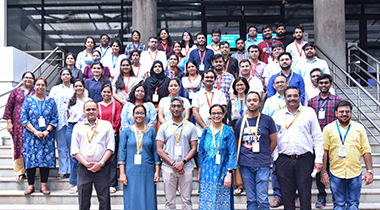
Events
Workshop on Mathematical Modelling of Infectious Diseases: Models, Data, and Basics of Calibration
June 19-20, 2023
The workshop focussed on the practical application of mathematical modelling to address questions of public health relevance in India. Eminent speakers delivered presentations on the National Tuberculosis (TB) Elimination Programme initiatives and the importance of mathematical modelling and its impact on policy decisions. Practical sessions were conducted on model calibration.
Participants from ICMR-National Institute for Research in Tuberculosis, International AIDS Vaccine Initiative, IIT Bombay, IIT Madras, International Institute for Population Science, Public Health Foundation of India, Shaheed Rajguru College of Applied Sciences, Tata Institute of Fundamental Research, Tamil Nadu Veterinary and Animal Sciences University, University of Hyderabad, and University of Mumbai attended the workshop.
The first day commenced with a brief presentation on the National Disease Modelling Consortium (NDMC) and the ongoing research conducted by the NDMC TB group by Prof. Sarika Mehra, from the Department of Chemical Engineering and principal investigator of the TB group. This was followed by an informative and educational presentation on "Initiatives under National TB Elimination Programme and opportunities of mathematical modelling for informed decisions" by Dr. Raghuram Rao, Assistant Director General, Central TB Division, from the Ministry of Health and Family Welfare, Government of India. Next, Prof. Nimalan Arinaminpathy, Professor in Mathematical Epidemiology, Faculty of Medicine, School of Public Health, Imperial College London conducted interactive practical sessions. The practical sessions aimed to enhance understanding of model calibration and enable participants to conduct simple model calibrations using approaches such as least-squares or maximum likelihood. Additionally, participants were familiarized with the role of uncertainty in model calibrations, including Bayesian calibration methods. Participants coded a simple SIR (susceptible, infectious, and/or recovered) model and engaged in a peak-matching exercise. This was followed by manual calibration of an SIR model through curve-fitting and automated calibration using least squares.
On the second day, Prof. Nimalan Arinaminpathy introduced the participants to likelihood methods through a concise and informative lecture. This was followed by an engaging practical session on coding and calibration of an SIR model using likelihoods. The concept of Bayesian calibration was also taught, and a practical session involving the implementation of simple Monte Carlo simulation in a TB model was conducted. Sample Python codes for all the questions were provided to participants at the end of each session. During these sessions, participants were encouraged to ask questions and engage in meaningful discussions, which enriched their overall learning experience. Dr. Swarup Sarkar gave an insightful talk on "Evidence to advocacy: Real life examples in public health: Where (does not) modelling make sense?", shedding light on how mathematical modelling aligns with the larger perspective of health policy decisions. Furthermore, to enable participants to build their own models, a virtual follow up session on calibrating a TB model using the Bayesian Markov Chain Monte Carlo method was conducted the following week.
